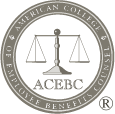Barry W. Homer
Barry W. Homer, who died in 2004 at age 54, was a noted employee benefits and executive compensation lawyer and active in the employee benefits leadership of the American Bar Association (“ABA”) after passage of the Employee Retirement Income Security Act of 1974 (“ERISA”). He was inducted as a Fellow of the American College of Employee Benefits Counsel (the “College”) in 2003.
Barry graduated from the University of Kansas in Lawrence, Kansas, in 1972 and then obtained his law degree from the University of Chicago School of Law in 1975.
Following his graduation, he entered private practice joining the San Francisco law firm Brobeck, Phleger & Harrison LLP (ceased operations in 2003). Barry and his then colleague at Brobeck, Jim DiBernardo, were among the leadership in Brobeck’s employee benefits and executive compensation practice. Jim recalled that Barry “chose ERISA as his practice area because he believed the massive changes brought about by that law gave young lawyers more of an equal footing with older practitioners because everyone had to learn the new law. He definitely succeeded in mastering the new law. He was able to provide concise and practical advice to clients and quickly gained their confidence while still only a mid-level associate. His primary clients were Wells Fargo Bank and Matson Navigation Company. He also gained the respect of his fellow attorneys.”
Barry’s employee benefits and executive compensation law accomplishments included a broad range of sophisticated matters including securities regulatory and tax controversy engagements. Barry and his firm were active in many of the important benefits issues of the day and also provided input to Congress. In 1991, in the wake of the insolvency of the Executive Life Insurance Company of California which resulted in participant account losses among “fixed income” investment offerings in affected employee retirement plans across the country, their firm submitted a statement to address concerns on behalf of the Committee of Companies Concerned for the Annuities for Retired Employees. Barry continued his practice at Brobeck, achieving partner, for 20 years before joining Morgan, Lewis & Bockius LLP for the final two years of his career.
A nationally recognized expert, educator, and leader from the early years of ERISA, Barry served as one of the initial members of the American Bar Association (“ABA”) Joint Committee on Employee Benefits.
Barry spoke at numerous ABA and Practising Law Institute programs. He also added to the written scholarship of ERISA. Together with College Fellows Richard Gilbert and Carolyn Smith, Barry co-authored the Attorney’s Guide to Pension & Profit Sharing Plans, a book published by Continuing Education of the Bar-California in June 1985.
Barry’s colleague Jim DiBarnardo recalled Barry’s memorable and helpful example, “Barry was truly one of a kind. Although he came to liberal San Francisco right out of Chicago Law School, he never departed much from his more conservative upbringing in Kansas. He always remained a calm and composed attorney no matter the situation. While at Brobeck, he was head of the Employee Benefits Group for a number of years and mentored a number of associates in that group to partnership or senior counsel positions. Barry still had that conservative streak but his even tempered and patient manner was a humbling example to us all.”
College Fellow Bob Abramowitz with whom Barry practiced at Morgan Lewis also noted Barry’s many strengths: “in the two years we practiced together, I quickly came to appreciate Barry’s breadth of substantive knowledge, his wisdom and his practicality.” Barry clearly left a legacy building the next generation of employee benefits and executive compensation practitioners.
Photo Source: Morgan, Lewis & Bockius LLP


